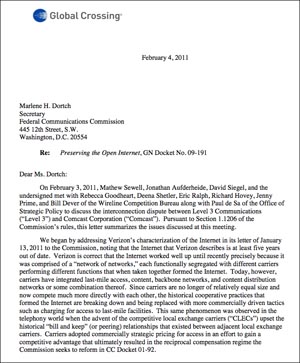Global Crossing Asks FCC To Regulate Intercarrier Fees, Disagrees With Verizon
 Last Friday, in a letter sent to the FCC, Global Crossing urged the commission to regulate the pricing for connections between last mile providers and network service providers saying that “broadband ISPs are distorting the economics of the historical peering relationships that existed between carriers“. Global Crossing also disagrees with a letter Verizon sent to the FCC in January saying that, “the Internet that Verizon describes is at least five years out of date.”
Last Friday, in a letter sent to the FCC, Global Crossing urged the commission to regulate the pricing for connections between last mile providers and network service providers saying that “broadband ISPs are distorting the economics of the historical peering relationships that existed between carriers“. Global Crossing also disagrees with a letter Verizon sent to the FCC in January saying that, “the Internet that Verizon describes is at least five years out of date.”
Global Crossing argues that today, the Internet is no longer comprised of networks isolated to one purpose and that many carriers networks are now integrated with last-mile access, content, backbone networks and CDNs. They go on to say that since carriers are no longer of equal size and now compete much more directly with each other, “the historical cooperative practices that formed the Internet are breaking down and being replaced with more commercially driven tactics such as charging for access to last-mile facilities.”
Global Crossings argument, which I think is a good one, is that this was the same problem that happened in the telephony market when the competitive local exchange carriers (CLECs) upset the peering relationships that existed with local exchange carriers. And while Global Crossing says they recognize that Comcast has not attempted to impose tariff-based access charges in the traditional sense of how telephone companies have imposed access charges, “the assessment of a fee for the delivery of traffic over last-mile facilities is the functional equivalent of an access charge“.
If this were to take place, Global Crossing says, “the ultimate result would be to skew the development of broadband competition while undermining the interests of consumers in obtaining the Internet content that they want, when they want it.”
In the Implementation of the Local Competition Provisions in the Telecommunications Act of 1996; Intercarrier Compensation for ISP-Bound Traffic, Global Crossing points out that the FCC specifically “sought to guard against carriers’ improperly shifting all of their costs to other carriers by charging them excessive rates for the use of their networks“. The Commission invoked that general principle in addressing the terminating access rates charged by CLECs, which Global Crossing argues is a scenario that is, “substantially similar to the one presented here“.
Global Crossing’s real argument is that the predicament faced by parties that send traffic to a broadband ISP’s subscribers today is substantially similar to those which the Commission has not hesitated to remedy in the past. Global Crossing says that, “the Commission has refused to tolerate such practices in the past” and that, “the application of access charges without any regulatory oversight would thoroughly undermine all of the Commission’s efforts in the instant docket to preserve an open Internet.”
While many have been quick to argue that they don’t want the government involved in this disputer, Global Crossing ends the letter by saying that, “the Commission can ameliorate the problems associated with terminating monopolies in today’s Internet and preserve an open Internet without complex and extensive regulation. The Commission need only apply its existing, long-held principles of cost-recovery and safeguards for terminating monopolies in the context of the instant dispute.”
This topic is a hot debate in the industry right now and each time it comes up, many networking and technical people want to weigh in on how the Internet and peering works or want to explain the complexity of the Internet. But the bottom line is we need more business people weighing in on the topic as the heart of this debate is not about technology or network architecture but rather the impact this could have on business models and consumers.
Similar Posts:
– The Real Issue In Comcast’s Dispute With Level 3 Is About Power, Not Money
– Comcast Says Their Dispute With Level 3 Is “Not About Online Video” – Yeah Right
– Level 3’s Lower Cost Comes From Owning The Network, Not Free Peering
